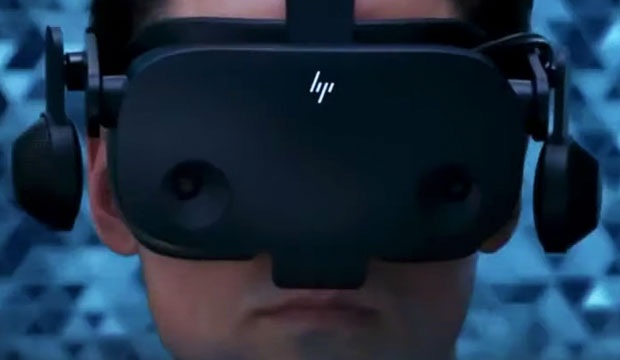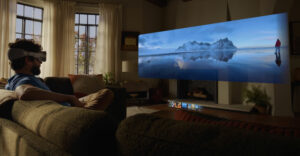The benefit of video conferencing, particularly during this COVID-19 pandemic, is not having to leave home. Unless you have people bringing the virus into your house, the odds of catching the virus fall if you can cut down on going to the office or school and stay off of planes and public transportation.
But even with the best tools, you still don’t have that same feeling of being there and still are disadvantaged against those who take the risks of going to the meeting or event venue.
Virtual reality (VR) held the promise of merely putting on a headset, along with everyone else, and meeting in a virtual world where you could manipulate in simulation. Now, HP has taken a considerable step to usher us to a future where we really can mostly exist in a virtual, rather than real, office environment; and not only get more done but be safer as well.
Let’s talk about that this week, and we’ll close with my product of the week — a new laptop from HP for those that still need a nice flexible notebook for back-to-school or personal use: the new HP Spectre x360 Convertible.
Moving to a Virtual World
For those of us who are fans of the book and movie “Ready Player One,” there’s this promise of being able to put on some hardware and gain an entirely new identity in a photorealistic virtual world. I’m also a fan of LitRPG, where the stories revolve around people living in these future virtual worlds.
We’re moving at an impressive rate to create virtual worlds, but we have missed several critical elements. Those include instrumenting the mouth and eyes so that the lips on virtual avatars move with the words realistically and expressions are more realistic. I don’t care how photorealistic the avatar is; if its face never moves, it looks creepy.
We also need a virtual environment to work in, move from controllers to haptic gloves, and eventually to haptic suites or emersion pods. The first step is to get the headset right — to capture the needed information and translate it into the virtual environment.
HP Omnicept
Last week HP announced HP Omnicept, which is a solution that begins with a special headset. Omnicept provides the critical elements needed to create a virtual meeting room and lays a foundation for creating a virtual world where many of us could eventually spend much of our time.
HP has modified its latest second-generation reverb headset, the G2, to add some critical features — starting with the headset.
The Reverb G2 starts with high-resolution screens (2160 x 2160) for each eye, a Valve-designed speaker for audio clarity, four-camera built-in tracking with 90 percent coverage to instrument your arms through a full range of motion, and one of the most comfortable head straps in the segment (so you can use it for hours).
The Omnicept version adds eye-tracking, which lowers system load through foveated rendering. It could translate event expressions and heart rate to report on the user’s health and stress levels; and the critical face camera instruments of mouth and facial expressions.
Making this into a solution is a flexibly licensed SDK and a growing number of partners. One of those partners is Nvidia and its extraordinary Omniverse Machinima effort that allows a user to create a virtual environment using game resources and animate avatars with tools like this Omnicept effort.
These same tools could create virtual meeting spaces where users with headsets like the HP Reverb Omnicept could identify users with biometric markers and log them into the virtual meeting room. For variety, that meeting room could be in the past, space, or an imaginary world. The avatars controlled by the users could bee made to be period correct or be built from an enhanced image of the user.
In that room, you could shake virtual hands, have side conversations (managed by the room’s AI), transform any virtual wall into a presentation space — or even work with 3D objects — and potentially record the event in virtual space so future viewers could experience the meeting in VR.
Wrapping Up
HP’s Omnicept, coupled with Nvidia’s Omniverse and other similar tools, will get us a lot closer to our eventual virtual office of the future.
As noted above, we still need to get rid of the game controllers and go to some glove that will let us use our hands more naturally, and then we need to be able to create these virtual worlds.
We are getting ever closer to a time when our travel, work, or anyplace — maybe even including vacations (remember Total Recall) will become virtual.
Given the pandemic, which will keep many practices we now think of as transitory to be permanent, we need this capability as soon as we can get it. HP just took us one giant step closer. There is still a ton of work to do, but with Omnicept, we now can start to see the light at the end of what has been a very long tunnel.

The New HP Spectre Line of Laptops
HP sits in the shadow of Apple, and there is no love lost between those firms. The two partnered once with the iPod, and like most firms I’ve known that went down that road, HP got screwed. As a result, HP has increasingly focused on attractive designs as critical differentiators while holding to x86 and Windows standards.
Its latest flagship premium line of laptops using the Spectre brand always reminds me of James Bond. On top of design leadership, HP has also been working furiously to become the greenest of all the PC vendors and has championed efforts like using Ocean Born plastics and other recycled materials to reduce waste.
With this line, HP has embraced Intel’s Project Athena (branded Evo), which adds another layer of quality assurance to this offering. Evo means these laptops have Intel’s latest high-performance graphics parts, fast charging, longer battery life (generally over 9 hours and up to 15 hours), instant wake, Wi-Fi 6, and Thunderbolt 4.

The tagline for this latest line, which ranges from 13 to 14-inch screens, is “Beauty Meets Intelligence.” Along with this latest Intel technology, expect up to a 34 percent improvement in CPU technology and a whopping 79 percent over past Intel GPU technology.
Also in this line is a focus mode that dims the background distractions, auto color assures you see what you are supposed to see in an image, and AI noise removal to eliminate the annoying background noises that pollute Zoom meetings.
Other enhancements include:
Eyesafe, which removes the blue light to protect your eyes and sleep cycle; a Microsoft Hello compatible camera with a physical shutter, so folks don’t spy on you; fingerprint reader; and the option of a Sure View Reflect panel that will block others from seeing your screen when working at a Starbucks — or anyplace else.
You can also get up to a 4K OLED panel in these things, and you won’t believe how the colors pop in OLED until you have a TV or PC with an OLED panel.
The base price is US$1,199.99, but I’d at least opt for the high-nit screen and Sure View for the best experience. Now, these just came out last Friday. So, if you are shopping, look for the versions with the 11th-generation Intel processor and Evo branding, as these new laptops are substantially better than the last generation in terms of features and power.
Finally, these have a gold and black color or silver scheme. I like the gold and black (pictured above) because that laptop looks like it should belong to royalty. My choice in this line would be the Spectre x360 14 because I can use all the screens I can get right now, and I’m not traveling much, so the weight and size trade-off is acceptable. The HP Spectre x360 family is my product of the week.
























































How moronic, rather than sorted out the real world we all live in, switch to a fake one. No wonder humanity is doomed